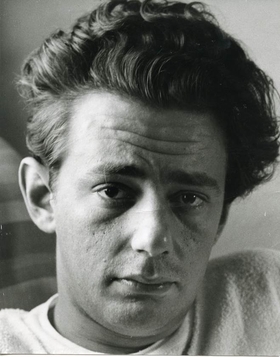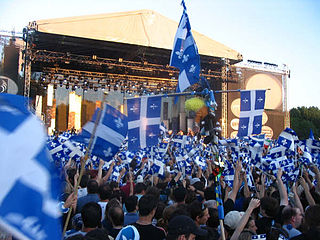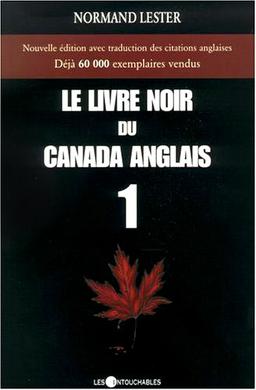
Mordecai Richler was a Canadian writer. His best known works are The Apprenticeship of Duddy Kravitz (1959) and Barney's Version (1997). His 1970 novel St. Urbain's Horseman and 1989 novel Solomon Gursky Was Here were nominated for the Booker Prize. He is also well known for the Jacob Two-Two fantasy series for children. In addition to his fiction, Richler wrote numerous essays about the Jewish community in Canada, and about Canadian and Quebec nationalism. Richler's Oh Canada! Oh Quebec! (1992), a collection of essays about nationalism and anti-Semitism, generated considerable controversy.

Jacques Parizeau was a Canadian politician and Québécois economist who was a noted Quebec sovereigntist and the 26th premier of Quebec from September 26, 1994, to January 29, 1996.

Le Devoir is a French-language newspaper published in Montreal and distributed in Quebec and throughout Canada. It was founded by journalist and politician Henri Bourassa in 1910.

Quebec nationalism or Québécois nationalism is a feeling and a political doctrine that prioritizes cultural belonging to, the defence of the interests of, and the recognition of the political legitimacy of the Québécois nation. It has been a movement and a central issue in Quebec politics since the beginning of the 19th century. Québécois nationalism has seen several political, ideological and partisan variations and incarnations over the years.
The Michaud Affair was a political controversy in Quebec that began in 2000. It revolved around the comments of Parti Québécois supporter Yves Michaud, those of the Quebec Jewish community and the subsequent censure motion from the National Assembly of Quebec members of parliament.
This is an article about literature in Quebec.
This article presents the current language demographics of the Canadian province of Quebec.

Gérard Pelletier, was a Canadian journalist and politician.

Le Livre noir du Canada Anglais is a series of three polemical books written by the Quebec journalist Normand Lester. Les Intouchables published the first volume in 2001. The essays relate from the author's point of view, while including many historians' citations, the historical fabrications and injustices in Canada, notably those against French-speaking Quebecers, Jewish and aboriginal peoples. Its publication resulted in Société Radio-Canada suspending Lester.

Charles William Foran is a Canadian writer in Toronto, Ontario.
Atna Jean Emmanuel (Manu) Njock, aka Zekuhl, is a singer, guitarist, percussionist and a songwriter of world music. He presents a Bolbo-Jazz style. He sings in Bàsàa, French and English.
The Traitor and the Jew, a history by Esther Delisle, was published in French in 1992. She documented the history of antisemitism and support of fascism among Quebec nationalists and intellectuals during the 1930s and '40s.
Anti-Quebec sentiment is a form of prejudice which is expressed toward the government, culture, and/or the francophone people of Quebec. This prejudice must be distinguished from legitimate criticism of Quebec society or the Government of Quebec, though the question of what qualifies as legitimate criticism and mere prejudice is itself controversial. Some critics argue that allegations of Quebec bashing are sometimes used to deflect legitimate criticism of Quebec society, government, or public policies.
The Jan Wong controversy refers to a claim made by Jan Wong on September 16, 2006, three days after the shooting at Dawson College in Montreal. Canada's nationally distributed newspaper of record, The Globe and Mail, published a front-page article titled, "Get under the desk," by Jan Wong. In the article, Ms. Wong controversially linked all three Quebec school shootings of the last two decades—1989 École Polytechnique Massacre, 1992 Concordia University Massacre, and 2006 Dawson College Shooting —to the purported alienation brought about by "the decades-long linguistic struggle" within the province. Public outcry and political condemnation soon followed in many venues. In response, a Globe and Mail editorial attempted to minimize the controversy as a "small uproar" over journalistic freedom, but this caused further condemnation. Jan Wong maintained her perspective and wrote extensively about the whole experience in her book Out of the Blue, A Memoir of Workplace Depression, Recovery, Redemption and, Yes, Happiness.
Je me souviens is a 2002 documentary film about antisemitism and pro-Nazi sympathies in Quebec during the 1930s through post World War II made by Montreal filmmaker Eric Richard Scott. The title of the film is French for I remember, and is the official motto of Quebec. The film was inspired by The Traitor and the Jew (1992-1993), a history of Quebec from 1929-1939, showing the links among antisemitism, nationalism, and fascism among Quebec Catholic intellectuals.

Joseph-Edmond-André Laurendeau was a journalist, politician, co-chair of the Royal Commission on Bilingualism and Biculturalism, and playwright in Quebec, Canada. He is usually referred to as André Laurendeau. He was active in Québécois life, in various spheres and capacities, for three decades. Laurendeau's career also "spanned the most turbulent periods in the history of Canada".
Victor-Lévy Beaulieu is a French Canadian writer, playwright and editor.
The Delisle–Richler controversy is the name given by academics to an historical controversy in Canadian history surrounding allegations of antisemitism made by Mordecai Richler and Esther Delisle on several pre-World War II Quebec personalities, notably against the priest-historian Lionel Groulx.
Montreal's Jewish community is one of the oldest and most populous in the country, formerly first but now second to Toronto and numbering about 82,000 in Greater Montreal according to the 2021 census. The community is quite diverse and is composed of many different Jewish ethnic divisions that arrived in Canada at different periods of time and under differing circumstances.
Stéphane Jorisch is a Canadian artist and illustrator. He is a two-time winner of the Governor General's Award for French-language children's illustration, winning in 1993 for Le Monde selon Jean de ... and in 1999 for Charlotte et l'île du destin, and a two-time winner of the Governor General's Award for English-language children's illustration, in 2004 for Jabberwocky and in 2008 for The Owl and the Pussycat.








